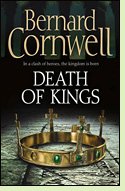Death of Kings
by Bernard Cornwell
Reviewed by David Maclaine

It is worth noticing the plural in the title Death of Kings. The opening of this sixth novel in the "Saxon Tales" series is deeply shadowed by the looming death of King Alfred, but there are many more kings and claimants for thrones jostling in the background. These include the scheming rulers of Northumbria and East Anglia; the ealdormen of Mercia and Kent who dream of reclaiming the lost crowns of those realms; a royal nephew convinced of his own right to the throne; Alfred's son Edward, the more likely heir; and a bevy of Danish warlords who hope to become the actual kings of all the Saxon realms. War seems all but certain, but instead there is a swirl of plots, betrayals and ambushes, much to the frustration of our hero and narrator, Uhtred of Bebbanburg, a Northumbrian pagan and Dane-lover who has repeatedly found himself the savior of Alfred's Wessex. Strange soothsayers lure men with tales of what will be, but few can see past their own ambition to decipher the truth. When war does come it arrives swathed in treachery; any strategy will prove fruitless that does not reckon with a host of uncertain loyalties. It is no surprise that much of the work of winnowing the overcrowded field of kingly candidates will fall to Uhtred's trusty swords, Serpent-Breath and Wasp-Sting.
As in the earlier books of this series, the great theme in Death of Kings is the heroic beginnings of the English nation, at this point still just the dream of a dying man. As Edward and his sister Æthelflaed take up their father's mantle, the series begins its pivot toward the next round of wars. Wessex and Mercia will be threatened once again, though this time the reward for victory will be more than mere survival. (2011, 336 pages)
More about Death of Kings at Powell's Books, Amazon.comThe Death of Kings appears on the list of The 45 Best Historical Novels Set in the Viking Age
Other novels about the heirs of King Alfred and their time:
The Edge on the Sword by Rebecca Tingle (2001), a novel for ages 12 and up about Æthelflaed at age 15, when her father betroths her to Æthelred. More info
Shieldwall by Justin Hill (2011), about a young man who survives the Viking raids of 1016 to fight in King Ethelred's army. See review or more info at Amazon.com
Nonfiction about Æthelflaed and Edward:
Aethelflaed: Royal Lady, War Lady by Jane Wolfe (2001). More info
Edward the Elder, 899-924 edited by N.J. Higham and D.H. Hill (2001). More info
Mercia and the Making of England by Ian W. Walker (2001). More info
Online:
Edward the Elder, King of the Anglo-Saxons at Anglo-Saxons.net
Back to Directory of Book Reviews